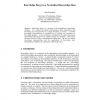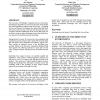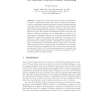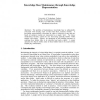113
click to vote
ECAI
1994
Springer
15 years 6 months ago
1994
Springer
1 A hybrid (symbolic/connectionist) cognitive architecture, DUAL, is proposed. It is a multi-agent system which consist of a large number of non-cognitive, relatively simple agents...
122
click to vote
ECAI
1998
Springer
15 years 6 months ago
1998
Springer
Many kinds of knowledge-based system would be easier to develop and maintain if domain experts (as opposed to knowledge engineers) were in a position to define and edit the knowled...
AIIA
1999
Springer
15 years 6 months ago
1999
Springer
This paper presents thedistributed implementationof ALIAS, an architecture composed of several cooperating intelligent agents. This system is particularly suited to solve problems ...
115
click to vote
DEXA
2000
Springer
15 years 6 months ago
2000
Springer
Knowledge ‘decay’ is a measure of the degradation of knowledge integrity. In a unified knowledge representation, data, information and knowledge are all represented in a single...
AH
2000
Springer
15 years 6 months ago
2000
Springer
Abstract. In this paper we suggest the Multibook approach how the gap between adaptivity and readability can be diminished. We show how a knowledge base has to be described by meta...
115
click to vote
SIGUCCS
2000
ACM
15 years 6 months ago
2000
ACM
The University of Pittsburgh's Computing Services and Systems Development organization is focused on the needs of the faculty and student population, totaling nearly 40,000 u...
132
click to vote
ICCS
2001
Springer
15 years 6 months ago
2001
Springer
We describe a knowledge server that permits Web users to retrieve and add knowledge in a shared knowledge base. The following features distinguish WebKB-2 from other ontology serve...
111
click to vote
ECSQARU
2001
Springer
15 years 6 months ago
2001
Springer
Abstract. A great deal of research has been devoted to nontrivial reasoning in inconsistent knowledge bases. Coherence-based approaches proceed by a consolidation operation which s...
104
click to vote
DEXA
2001
Springer
15 years 6 months ago
2001
Springer
The problem of maintaining a knowledge base is substantially concerned with keeping track of rules that share common wisdom. A knowledge representation is described in which a coll...
122
click to vote
OTM
2009
Springer
15 years 6 months ago
2009
Springer
In this paper, we want to show which difficulties arise when automatically constructing a domain-independent knowledge base from the web. We show possible applications for such a k...




